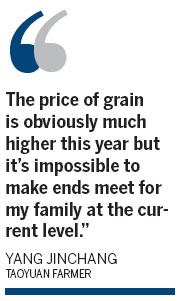Business
The price of rice soars but farmers are still unhappy
By Zhou Yan (China Daily)
Updated: 2010-08-23 13:46
 |
Large Medium Small |
Bad weather destroyed much of the crop in important growing region
CHANGDE, Hunan province - Sizzling summer used to be the busiest period for Yang Jianzhong for earning money, but this July's unusually heavy rains left him with hardly a penny.

The forty-something is among the biggest indica rice brokers in Taoyuan county, Changde city, one of the nation's top 10 rice-growing regions. Every year, he purchases the crop from 30,000 farmers in five villages in the county.
| ||||
He was left heart-broken after experiencing last month's downpours that flooded "a quarter of" the paddy fields in Taoyuan.
"My purchase volume this year is very likely to be halved," Yang said, adding that his earnings will also be dramatically cut because of a surge in freight fees and labor charges.

This year's purchase price for early-season indica rice has jumped to as much as 98 yuan per 50 kilograms in Changde, according to Changde Grain and Food Bureau. That compares with around 90 yuan per 50 kilograms last year.
The purchase volume for grain storage dropped for the first time in 10 years in the city. As of August 10, Changde only bought 116,500 tons of early-season indica rice, down 37 percent from the same period in 2009 because of the shortage, said Sun Jinhui, a top official at the bureau in charge of the city's grain circulation work.
Changde is the major indica rice-growing area in Hunan province, which produces China's largest amount of the crop with paddy output reaching 27.8 billion kilograms last year.
Cngrain.com, a website owned by China Grain Reserves Corp, a State-owned company that stockpiles grain, projected that China's early-season indica rice crops will drop by 10 percent in volume, with some areas suffering a 20 percent reduction because of the adverse weather.
This year, grain growers were reluctant to sell to brokers such as Yang, even though the country lifted the minimum buying prices for the early- and late-season indica crops to 93 yuan and 97 yuan per 50 kilograms respectively, up 3.3 percent and 5.4 percent from a year earlier.
China, the world's biggest consumer of rice, set the minimum purchase terms, under which the government will buy up rice when the market price is below the State-set level in order to protect farmers' interests.
The price for indica rice under the scheme has collectively jumped by 40 percent over the past three years. Indica is one of the two major varieties of rice.
The price jump for the crop also led to an 11.8 percent jump in the nation's grain prices in July, pushing the main inflation gauge - the consumer price index (CPI) - in July to its highest since October 2008.
"The price of grain is obviously much higher this year but it's impossible to make ends meet for my family at the current level," said Yang Jinchang, a farmer from Taoyuan.
He planted 16 mu of early-season indica rice and has just sold around 2,000 kilograms of the crop to companies and brokers this month at 95 yuan per 50 kilograms.
Yang complained of big price jumps for everything from fertilizer to reaping machines and the cost of labor. "The selling price cannot cover all my costs. I have to wait and see if there's room for any further increase in the selling price," Yang said, adding that 100 yuan per 50 kilograms would almost cover his expenses for planting the crop.
According to the grain and food bureau, labor costs have increased by 20 percent year-on-year to 50 yuan a person per day this year.
"Plant growers having less than 10 mu would suffer big losses this year," farmer Yang said, adding that farmers would only sell their crops if they were short of cash for living expenses.
Farmers' reluctance to sell their products has widened the supply deficit in the market and this has been transmitted to the rice processing companies.
"We only bought 600 tons of early-season indica rice per day this year compared with last year's more than 1,000 tons," said Xiao Dexiang, director of the board at Wanfushengke (Hunan) Agricultural Development Co, which is among the major purchasers of the crop in Changde.
The volume barely meets the company's needs, he said. "If the situation continues, we will have to buy the crop from the futures market at around 107 yuan per 50 kilogram."
That would mean it would be hard to avoid a reduction in profit growth for the company this year.
Market experts said that huge stockpiles of the grain following this year's expansion of the growing year may partly offset output losses and help the industry to weather this year's difficulties.
"I have concerns that more farmers will begin to plant cotton rather than rice next year after suffering the pain of this year. At least, cotton growers will earn thousands of yuan per mu this year," broker Yang said.
China Daily
